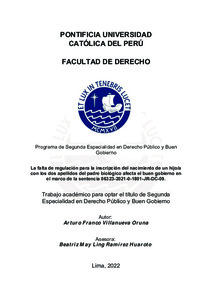| dc.contributor.advisor | Ramírez Huaroto, Beatriz May Ling | |
| dc.contributor.author | Villanueva Oruna, Arturo Franco | |
| dc.date.accessioned | 2023-05-19T16:22:45Z | |
| dc.date.available | 2023-05-19T16:22:45Z | |
| dc.date.created | 2022 | |
| dc.date.issued | 2023-05-19 | |
| dc.identifier.uri | http://hdl.handle.net/20.500.12404/24999 | |
| dc.description.abstract | La inscripción del nacimiento de un hijo/a busca lograr el reconocimiento de la
identidad del niño/a, y a su vez también permite registrar a los progenitores. La
regulación actual admite como excepción, en caso una mujer así lo decida, no
tener que revelar la identidad del padre de su hijo/a, pudiendo inscribir al niño/a
con los dos apellidos de ella. Sin embargo, para un padre dicha excepción no
aplica, en tanto no se contempló la potencial existencia de familias
monoparentales masculinas conformada por un padre y sus hijos/as al momento
que el legislador emitía la regulación.
El Código Civil peruano es una de las normas que regula la inscripción del
nacimiento de un hijo/a, y se caracteriza por tener una visión heteronormativa y
patriarcal, bajo la cual la filiación solamente ocurría por reproducción natural y
no contemplaba supuestos de familias monoparentales masculinas.
En línea a ello, la inexistencia en el Perú de un marco regulatorio eficiente acerca
de las técnicas de reproducción asistida, termina afectando derechos
fundamentales, como en este caso a través de la sentencia 06323-2021-0-1801-
JR-DC-09.
El Perú, siendo un Estado Constitucional de Derecho, reconoce en el artículo 44
de su Constitución al buen gobierno como un principio en la actuación de los
poderes públicos. Por tanto, es objetivo del presente trabajo determinar si la falta
de regulación y la negativa del Estado a que un padre inscriba con sus dos
apellidos a su hijo/a corresponde o no a una actuación acorde al principio
constitucional de buen gobierno. | es_ES |
| dc.description.abstract | The registration of the birth of a child seeks to achieve recognition of the identity
of the child, and in turn also allows the registration of the parents. The current
regulation admits as an exception, in case a woman so decides, not having to
reveal the identity of the father of her child, being able to register the child with
both of her last names. However, for a father, said exception does not apply, as
the potential existence of single-parent male families made up of a father and his
children was not contemplated at the time the legislator issued the regulation.
The Peruvian Civil Code is one of the norms that regulates the registration of the
birth of a child, and is characterized by having a heteronormative and patriarchal
vision, under which filiation only occurred by natural reproduction and did not
contemplate assumptions of male single-parent families.
In line with this, the non-existence in Peru of an efficient regulatory framework on
assisted reproduction techniques ends up affecting fundamental rights, as in this
case through ruling 06323-2021-0-1801-JR-DC-09.
Peru, being a Constitutional State of Law, recognizes good governance in article
44 of its Constitution as a principle in the actions of public powers. Therefore, the
objective of this paper is to determine whether the lack of regulation and the
State's refusal for a father to register his son with her two last names corresponds
or not to an action in accordance with the constitutional principle of good
governance. | es_ES |
| dc.description.uri | Trabajo académico | es_ES |
| dc.language.iso | spa | es_ES |
| dc.publisher | Pontificia Universidad Católica del Perú | es_ES |
| dc.rights | info:eu-repo/semantics/openAccess | es_ES |
| dc.rights.uri | http://creativecommons.org/licenses/by/2.5/pe/ | * |
| dc.subject | Personas (Derecho) | es_ES |
| dc.subject | Derecho de familia--Perú | es_ES |
| dc.subject | Identificación | es_ES |
| dc.subject | Administración pública--Perú | es_ES |
| dc.title | La falta de regulación para la inscripción del nacimiento de un hijo/a con los dos apellidos del padre biológico afecta el buen gobierno en el marco de la sentencia 06323-2021-0-1801-JR-DC-09 | es_ES |
| dc.type | info:eu-repo/semantics/bachelorThesis | es_ES |
| thesis.degree.name | Segunda Especialidad en Derecho Público y Buen Gobierno | es_ES |
| thesis.degree.level | Título Profesional | es_ES |
| thesis.degree.grantor | Pontificia Universidad Católica del Perú. Facultad de Derecho | es_ES |
| thesis.degree.discipline | Derecho Público y Buen Gobierno | es_ES |
| renati.advisor.dni | 41941378 | |
| renati.advisor.orcid | https://orcid.org/0000-0001-9452-0696 | es_ES |
| renati.author.dni | 70688281 | |
| renati.discipline | 421149 | es_ES |
| renati.level | https://purl.org/pe-repo/renati/level#tituloSegundaEspecialidad | es_ES |
| renati.type | https://purl.org/pe-repo/renati/type#trabajoAcademico | es_ES |
| dc.publisher.country | PE | es_ES |
| dc.subject.ocde | https://purl.org/pe-repo/ocde/ford#5.05.01 | es_ES |







